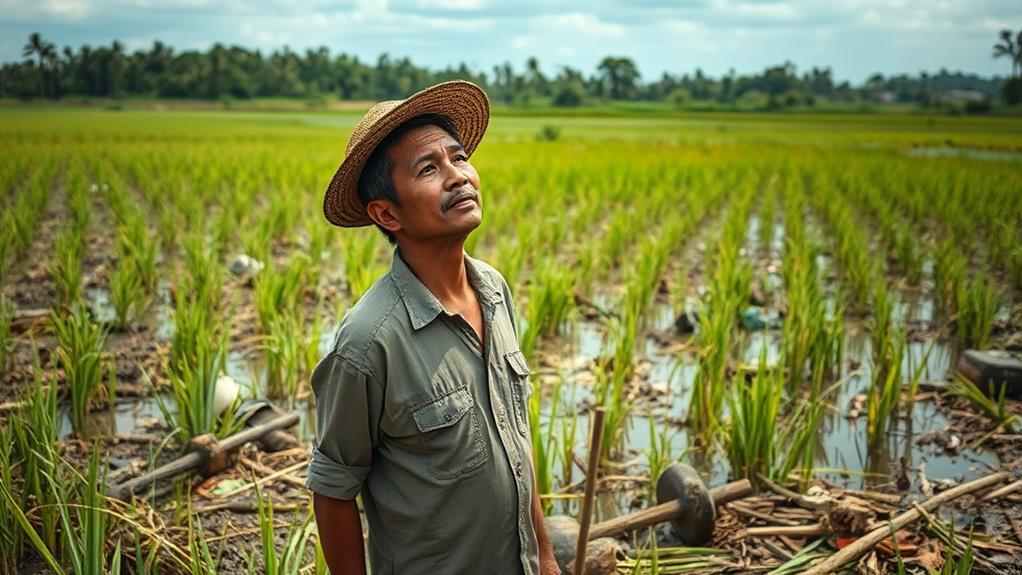Bahala Na: A Filipino Attitude of Resilience and Trust
When faced with life's uncertainties, embracing the Filipino attitude of "Bahala Na" can be a powerful coping mechanism. This mindset, which translates to "whatever happens, leave it to God," originated from the Tagalog word "Bathala," emphasizing faith's significance.
By adopting Bahala Na, individuals foster resilience and hope while striking a balance between trust in divine providence and personal responsibility.
This complex attitude has multifaceted applications, nuances, and implications. For instance, in the face of adversity, Bahala Na allows individuals to navigate challenges with courage and optimism.
It also encourages them to take responsibility for their actions while trusting in a higher power. By embracing Bahala Na, individuals can grow and find optimism in uncertain times.
Cultural Roots of Bahala Na

Bahala Na: Trust in Divine Providence
In Filipino culture, faith and resilience are deeply intertwined, giving rise to the concept of Bahala Na. This cultural value reflects a profound trust in divine providence. The phrase "Bahala Na" originates from the Tagalog word "Bathala," meaning God, highlighting the significance of faith in navigating life's uncertainties.
Bahala Na translates to "whatever happens, leave it to God," illustrating a deep-seated belief that God has a plan, even in the face of unpredictability. As a cultural coping mechanism, Bahala Na allows individuals to confront challenges with a sense of resilience and hope. By embracing this concept, Filipinos can find solace in the idea that their fate isn't entirely in their hands, yet they still maintain a sense of personal responsibility to influence their circumstances.
This delicate balance is at the heart of Bahala Na, a concept that permeates various aspects of Filipino life and values. For example, in times of crisis, Filipinos often turn to prayer and faith to find comfort and guidance.
This trust in divine providence enables them to confront challenges with courage and optimism, rather than despair and hopelessness.
The Duality of Bahala Na
Bahala Na: A Delicate Balance
Trust in Divine Providence
Bahala Na, a Filipino concept, embodies a delicate balance between trust in divine providence and personal responsibility.
On one hand, it can inspire courage in the face of uncertainty, motivating individuals to take bold steps towards their goals while trusting that everything will work out for the best. For instance, a father might prioritize family togetherness over financial stability, believing that divine providence will provide for their needs.
Complacency and Fatalism
On the other hand, Bahala Na can lead to complacency and fatalism, causing individuals to surrender to fate without making an effort to change their circumstances. This mindset can result in cycles of self-neglect and dependency.
For example, a woman might trust fate for job opportunities abroad without taking proactive steps to improve her skills or network.
The Balance Between Action and Inaction
The phrase "Bahala na si Batman" humorously highlights the importance of finding a balance between action and inaction in Filipino culture.
While Bahala Na can serve as a coping mechanism that fosters resilience, it's essential to avoid misapplying it, which can lead to negative consequences. By recognizing the duality of Bahala Na, individuals can harness its positive aspects while avoiding its pitfalls.
Real-Life Applications of Bahala Na

Bahala Na's Real-Life Applications
Influencing Everyday Life
Bahala Na's real-life applications are far-reaching, influencing the way Filipinos approach everyday challenges and extraordinary crises alike.
When faced with uncertainty, Filipinos make difficult decisions, trusting that fate will guide them through. For instance, a father may prioritize family togetherness over financial stability, believing that faith will provide for their needs.
Promoting Resilience and Courage
As a coping mechanism, Bahala Na promotes resilience and courage in the face of adversity, helping Filipinos navigate unpredictable life events.
Its societal implications are evident in collective actions taken by communities during crises, demonstrating a shared commitment to support one another and find hope amidst uncertainty.
Fostering Collective Resilience
By embracing uncertainty, the Filipino attitude towards Bahala Na fosters a sense of collective resilience, enabling individuals and communities to thrive in the face of adversity.
This collective resilience is evident in communities that come together to support each other during crises, showcasing the power of Bahala Na in everyday life.
Balancing Faith and Action
Striking a balance between faith and action is crucial in embodying the essence of Bahala Na. This delicate balance allows you to acknowledge the unpredictability of life while taking proactive steps to shape your own destiny.
Your faith in a higher power provides comfort and guidance, but it's up to you to take concrete actions to achieve your goals. This mindset is aptly captured in the Filipino saying "Nasa Diyos ang awa, nasa tao ang gawa," which emphasizes the dual importance of faith and personal responsibility.
By adopting this approach, you can navigate life's challenges with courage and hope. For instance, when facing a difficult situation, you can pray for guidance and strength, but also take concrete steps to address the problem.
This balance is key to harnessing the resilience and determination that Bahala Na embodies, enabling you to face uncertainty with confidence and perseverance.
Critiques and Challenges of Bahala Na

The Bahala Na attitude can hinder social and economic progress. Critics argue that its passive undertones can lead to complacency, causing individuals to accept social issues without taking action to address them. For example, in communities plagued by corruption and injustice, people may rely on Bahala Na instead of demanding change, thereby perpetuating these problems. This can lead to cycles of hardship and unemployment, as individuals fail to take responsibility for their own lives and futures.
Relying on Bahala Na can undermine personal accountability. By adopting a fatalistic mindset, individuals may avoid taking necessary actions to improve their circumstances. This can create burdens for their families and hinder their future plans. For instance, a student who relies on Bahala Na to pass an exam without studying may not develop the skills and knowledge needed to succeed in their chosen career.
The dual nature of Bahala Na can complicate decision-making. While it encourages risk-taking, it also fosters fatalism, leading to ambivalence in personal accountability. This can result in indecision and a lack of initiative, as individuals struggle to balance their desire for action with their reliance on divine intervention.
Bahala Na can undermine collective efforts to improve societal conditions. When individuals rely too heavily on divine intervention, they may not take initiative to address social problems. This can hinder collective efforts to create positive change, as people fail to work together to address common issues. For example, in the face of environmental degradation, people may rely on Bahala Na instead of taking action to reduce their carbon footprint, thereby perpetuating the problem.
How does the concept of Utang Na Loob contribute to the Filipino attitude of Bahala Na?
The Filipino debt of gratitude, known as “Utang Na Loob,” shapes the Bahala Na attitude by emphasizing the importance of returning favors. This concept fosters a sense of reciprocity and community support, contributing to the collective willingness to trust fate and accept whatever comes, a key element of the Bahala Na mindset.
Embracing Uncertainty With Courage
Embracing Uncertainty with Courage
Bahala Na: A Mindset of Courage
The concept of Bahala Na is about facing uncertainty with courage, trusting that outcomes will unfold as they should.
This mindset encourages you to take risks with faith in the unknown, rather than avoiding them. By doing so, you develop problem-solving skills, foster hope and optimism, and grow as a person.
Overcoming Fear and Stress
Bahala Na means you're not held back by fear or stress, even in high-pressure situations like job loss or health crises.
Instead, you take control, trusting that the universe has your back. For example, individuals who take jobs abroad despite uncertainties often experience significant personal and communal benefits.
This mindset leads to remarkable growth and resilience.
Frequently Asked Questions
What Is the Bahala Na Attitude in Filipino Values?
What is the Bahala Na Attitude in Filipino Values?
The Bahala Na attitude is a mindset that balances proactive behavior with acceptance of life's unpredictability. This attitude has its roots in the Tagalog word "Bathala," meaning God, and is deeply ingrained in Filipino cultural values.
In everyday life, Bahala Na means taking action while also accepting that some things are beyond one's control. For example, a person with a Bahala Na attitude might study hard for an exam, but also acknowledge that the outcome isn't entirely in their hands.
Bahala Na inspires resilience and trust in the face of adversity. When faced with challenges, individuals with this attitude are more likely to adapt and find ways to overcome obstacles.
This mindset also influences personal responsibility and decision-making, as individuals learn to balance their efforts with acceptance of life's uncertainties. By embracing this duality, Filipinos are able to navigate life's challenges with a sense of hope and determination.
How Does the Filipino Philosophy of Bahala Na Reflect the Attitudes Towards Uncertainty and Decision Making in the Country?
Filipinos approach uncertainty with a mix of caution and courage. This unique attitude towards uncertainty stems from a cultural resilience that allows them to navigate unpredictable situations with a sense of faith.
In the Philippines, decision-making processes involve a delicate balance between surrendering to fate and taking proactive steps. For instance, when faced with a natural disaster, Filipinos will prepare for the worst while also having faith that they'll get through it together.
This approach reflects a trust that whatever comes will be manageable, and that collective action can overcome even the toughest challenges.
What Is Bahala Na Attitude a Filipino Way of Coping With Uncertainties?
Bahala Na is a unique Filipino coping mechanism that blends cultural resilience and a positive outlook to navigate life's uncertainties. This attitude allows individuals to accept what's beyond their control while taking proactive steps to mitigate risks.
For example, during natural disasters, Filipinos often prioritize community and family, focusing on providing emotional support and sharing resources to overcome the challenges.
By embracing this mindset, individuals can find comfort and hope in the face of adversity, drawing strength from their community and cultural heritage. For instance, the concept of "bayanihan" (communal unity) is deeply rooted in Filipino culture, where neighbors and communities come together to help each other during difficult times.
Bahala Na isn't about being passive or fatalistic; rather, it's about focusing on what can be controlled and finding ways to minimize the impact of uncertainties.
Are We Showing Our Faith in God When We Say "Come What May"?
When you say "come what may," you may be expressing faith in God, but it's crucial to examine your intentions.
Saying "come what may" can be seen as a faith expression, demonstrating trust that a higher power will guide outcomes. For instance, when faced with uncertainty, a person of faith might say "come what may" to convey their belief that God will work things out for their good. This phrase can indeed be a declaration of trust in God's sovereignty.
However, "come what may" can also imply an acceptance mindset, where you're surrendering control and acknowledging the unpredictability of life. In this sense, the phrase mightn't necessarily reflect faith in God, but rather a resignation to the fact that some things are outside of human control. It's essential to distinguish between genuine faith and passive resignation.
Ultimately, when saying "come what may," it's vital to ensure that your trust in God doesn't overshadow your personal responsibility. While faith is important, it shouldn't excuse you from taking action or making decisions.